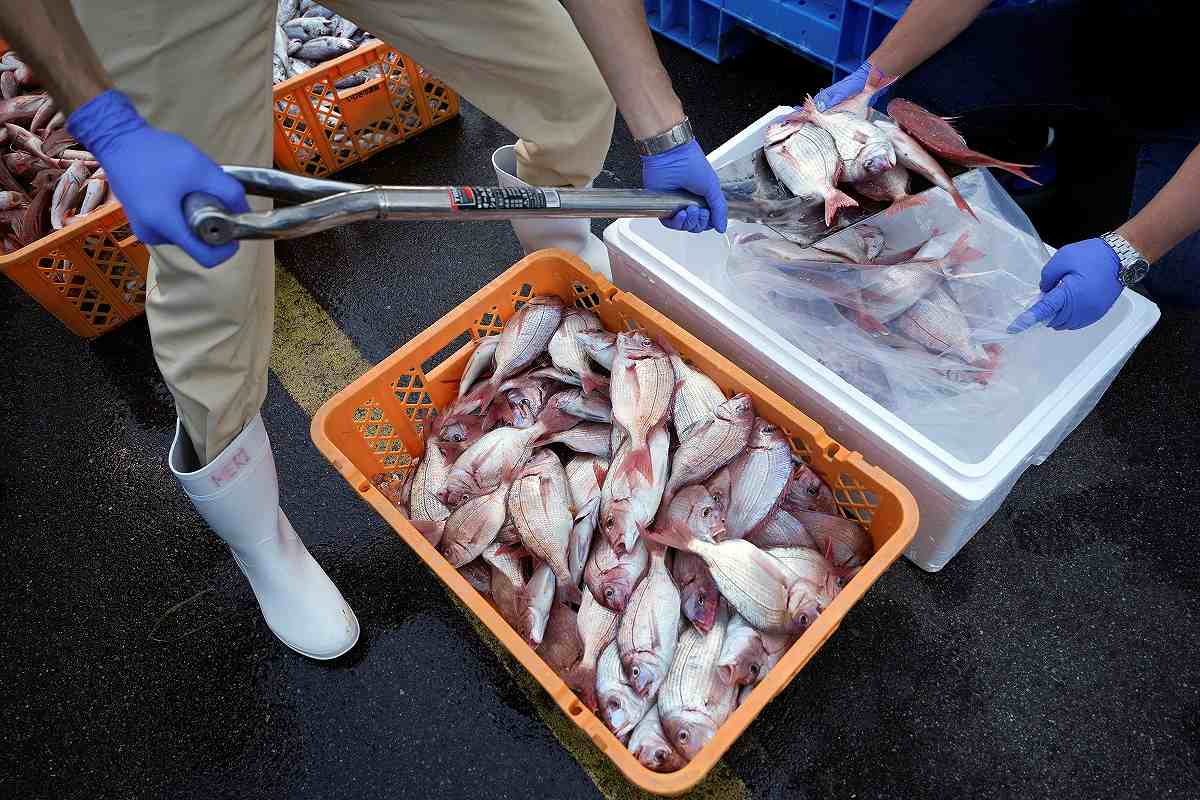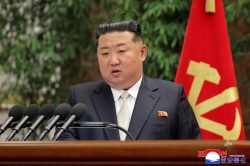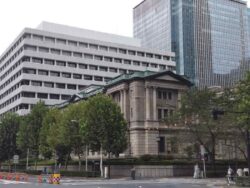
FILE PHOTO: Local staff encase the sample fish to a cold box for a team of experts from the International Atomic Energy Agency (IAEA) with scientists from China, South Korea and Canada at Hisanohama Port, Thursday, Oct. 19, 2023 in Iwaki, northeastern Japan.
9:57 JST, October 30, 2023
TOKYO, Oct 29 (Reuters) – The Group of Seven (G7) industrial powers called on Sunday for the “immediate repeal” of import curbs on Japanese food products, a reference to China’s restrictions after Japan began releasing wastewater from the Fukushima nuclear power plant.
The G7 trade ministers, in a statement after a weekend meeting on Osaka, did not mention China but they also denounced what they consider its rising economic coercion through trade.
“We deplore actions to weaponize economic dependencies and commit to build on free, fair, and mutually beneficial economic and trade relationships,” said the 10-page statement.
China slapped a blanket suspension of Japanese fish imports two months ago when Japan started the release of treated radioactive water from the wrecked Fukushima plant into the Pacific. While Japan and the U.S. have called the curbs unfair, Russia announced a similar restriction earlier this month.
In response, China described G7’s move as “economic coercion” and urged the G7 not to “stubbornly adhere to double standards” but take practical action to maintain the normal international trade and investment order.
“The G7 members undermine the level playing field and disrupt the security and stability of global production and supply chains,” China’s embassy in Japan said in a statement late on Sunday.
The G7 – the United States, Japan, Germany, Britain, France, Italy and Canada – expressed “concern” over recent control measures on the export of critical minerals.
China, the world’s top graphite producer, this month announced export curbs on the key material, used in electric vehicle batteries, in another bid to control critical mineral supply in response to challenges over its global manufacturing dominance.
The G7 ministers “shared the need, a genuinely strong one, to reduce dependence on a particular country” for the supply of critical resources, said Yasutoshi Nishimura, trade minister of the host Japan. “We completely agreed to build resilient and reliable supply chains” for critical minerals, semiconductors and batteries, he told a press conference.
The ministers reaffirmed their concerns on “a wide and evolving range of non-market policies” that include “pervasive, opaque and trade-distortive industrial subsidies” and forced technology transfer, the statement said.
On Russia, the G7 officials condemned its destruction of Ukrainian grain export infrastructure in its invasion of the country, and Moscow’s decision to “unilaterally” leave talks on an agreement that had allowed grain giant Ukraine to export wheat and other products through the Black Sea.
Unlike the G7 finance ministers’ meeting two weeks ago, which condemned “terror attacks” on Israel by Hamas, the trade ministers did not mention the Middle East crisis, saying only that they “seek to raise awareness about the challenges of moving humanitarian goods across international borders during natural disasters and other emergencies.”
Western countries have generally backed what they say is Israel’s right to self-defense, but there has been mounting international concern over the toll from Israel’s bombing and growing calls for a pause to allow aid to reach Palestinian civilians in Gaza.
Top Articles in News Services
-

Survey Shows False Election Info Perceived as True
-

Hong Kong Ex-Publisher Jimmy Lai’s Sentence Raises International Outcry as China Defends It
-

Japan’s Nikkei Stock Average Touches 58,000 as Yen, Jgbs Rally on Election Fallout (UPDATE 1)
-

Japan’s Nikkei Stock Average Falls as US-Iran Tensions Unsettle Investors (UPDATE 1)
-

Japan’s Nikkei Stock Average Rises on Tech Rally and Takaichi’s Spending Hopes (UPDATE 1)
JN ACCESS RANKING
-

Producer Behind Pop Group XG Arrested for Cocaine Possession
-

Japan PM Takaichi’s Cabinet Resigns en Masse
-

Man Infected with Measles Reportedly Dined at Restaurant in Tokyo Station
-

Israeli Ambassador to Japan Speaks about Japan’s Role in the Reconstruction of Gaza
-

Videos Plagiarized, Reposted with False Subtitles Claiming ‘Ryukyu Belongs to China’; Anti-China False Information Also Posted in Japan

























